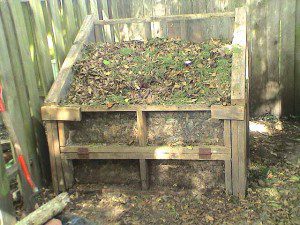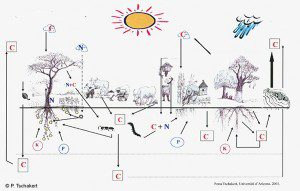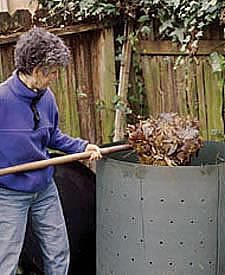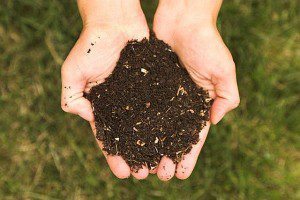Soils Need Organic Matter!
It really matters!
In the last part of this series we will go over the processes of whats going on in your compost pile. It really gives you better sense of gratification when you have a more intimate knowledge of whats going on in your compost. The life and energy and activity going on in that big ole heap is much more than just a pile of decomposing stuff. Its a whole mini ecosystem full of enzymes, bacterias and awesome bugs that will some day help give birth to an amazing garden.
How to get your compost busy:
Let me empasise this, just because you followed all the rules that were provided for you so far does NOT mean that your compost is going to just start happening. You need a couple of vital environmental factors otherwise, you’re pile will just sit there, seeming to NEVER break down.
Lets put on our lab coats and get scientific for a minute. To decompose, we need two very major elements–Carbon and Nitrogen. The carbon is going to be the energy source of the the pile. Much like our bodies need simple carbohydrates to keep us moving during the day, your compost need energy too. Carbons such as leaf debris and certain kitchen wastes provide this much needed fuel, without it, it will take a very VERY long time for you to see any real activity.
Nitrogen is going to be the left jab in your one two punch of the compost fight. Nitrogen in the greener materials such as kitchen waste and various garden clippings, provides microbes with the raw element of proteins to build their bodies. Without the microbes, the decomposition won’t occur at all.
Time To Carbo-Load!
The process of decomposition of waste into organic matter really isn’t too much different from how our own bodies work, our bellies need probiotics to aid in digestions, and compost piles need microbes to “digest” the raw materials provided. Our bodies need proteins to grow muscles and your compost piles need carbon to have fuel to consume to decompose. If our bodies didn’t protein, we’d be inefficient–if a pile doesn’t have carbon, it would be inefficient.
Chew Before You Swallow
Also, like our bodies, compost is going to break down easier and faster when taken in smaller doses. By chopping your additions to your pile into small, bite sized pieces, the surface area will increase and the microbes will have more area to attach and attack! People have been known to keep a variety of different shredding devices such as taking a machete to the pile or even keeping a blender under the kitchen sink for the devoted purpose of running waste through it BEFORE adding it to the pile. Just like our bodies, if we took big bites and didn’t chew good enough, our bellys would say “What the heck, this is hard work”. Your pile will act the same.
Water Water Water!
Again, much like our bodies, your pile needs air and water to, well, breathe! Without proper moisture levels, those same microbes that are digesting your pile will get dehydrated, just like you working in the garden on a hot summer day. The fatigue will set in and productivity will go down, and its not just as simple as the microbes going inside to refresh in the air conditioning and sip a tasty beverage. Periods of dehydration could mean the loss of large colonies of these organisms and re population isn’t as quick as you might think. Take into consideration also, too much water is also a bad thing. We as humans should consume a set amount of water every day, but NOT at one sitting. If we were to sit and consume all 8 glasses of water as soon as we woke up in the morning just to get it out of the way, again, we would be very sluggish and inefficient (and pee a lot). Periods of severe moisture in a pile can lead to mold (which eats up the good microbes and just over all nastiness). Your compost pile should have the hydration level of a bath towel after bathing, nothing more.
Repopulate and Destroy!
Sometimes we all need an extra kick in the pants to get us remotivated in the afternoon, your compost pile may need the same thing. Luckily enough, you can go buy a bag of enzymes (sounds kind of gross, but really it has the texture of, well, kitty litter). Espoma makes a very easy to use product called Bio-Excelerator, which you just turn into your pile and stand back and watch it go! Sprinkle enough Bio-Excelerator to completely cover your compost pile (approximately 1 cup per 16 square feet of compost). Each time you add another layer of organic material, sprinkle Bio-Excelerator completely over your last layer. If you completely moisten (not soak) the added layer after your application of Bio-Excelerator and turn the pile regularly (preferably once a week), you can reduce the time required for humus production to 2 to 3 months minimum.
Turn, Turn, Turn
(no, not The Byrds Song)
One of the easiest ways to increase decomposition in your compost pile, and to solve many compost problems, is to regularly turn and aerate your compost. Depending on the method you choose to turn your pile, it can be sweaty work or a breeze. Turning (aerating) your pile may mean all the difference between getting compost within 4-8 weeks or 3-8 months. Every pile needs a sudden burst of oxygen to keep it on its toes. If not, your compost heap may just sit there and be inefficient. This anaerobic condition (meaning without air) means slower decomposition, lower temperatures which also mean, you’ll be waiting for your compost for a lot longer.
Of course, there are zillions of other little quirks about compost piles that you may encounter, way too many to be covered in just three parts. Starting your pile should be easy, not feel like a chore. If you feel like its more work than is worth it, for goodness sakes, don’t do it. You should have pleasure in your gardening experience, don’t become a slave to it. If you encounter anything suspicious in your pile, please don’t hesitate to call us here at the nursery. We can help you!










